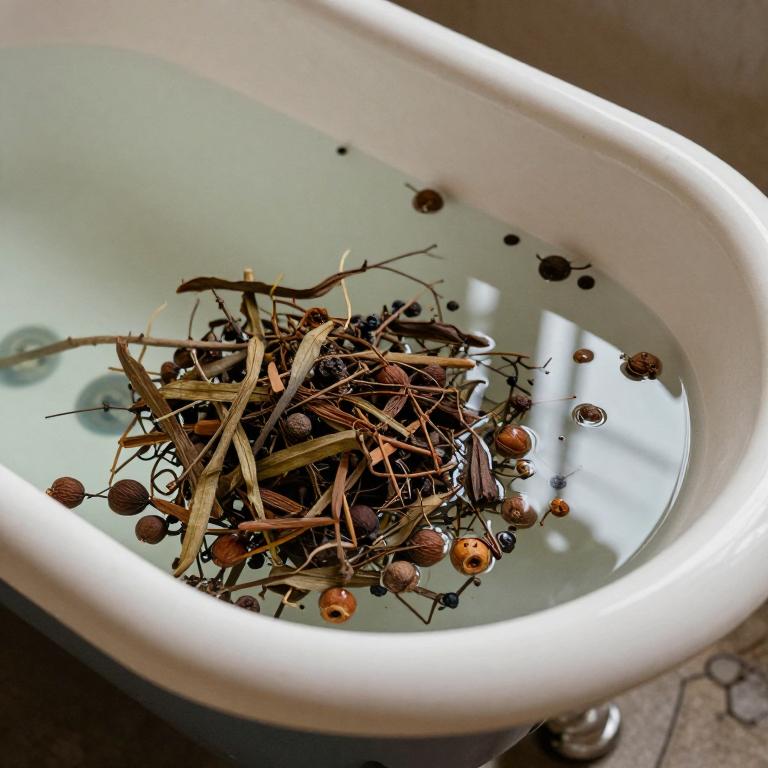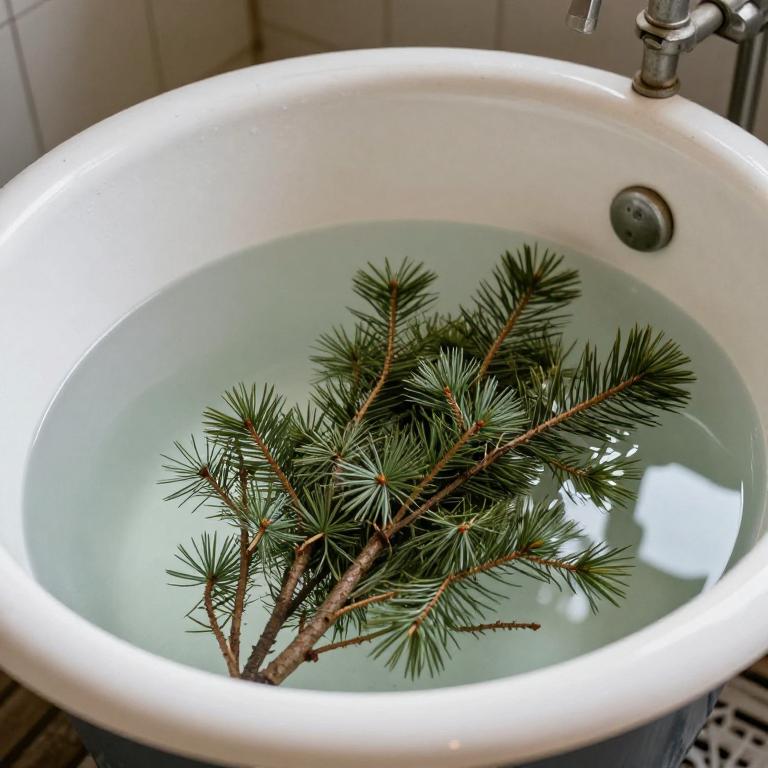10 Best Herbal Baths For Chronic Bronchitis

Herbal baths can be a soothing and complementary therapy for individuals with chronic bronchitis, offering potential relief from respiratory symptoms through the inhalation of aromatic herbs.
Certain herbs, such as eucalyptus, lavender, and peppermint, are known for their anti-inflammatory and decongestant properties, which may help ease breathing and reduce mucus buildup. When added to warm bath water, these herbs release essential oils that can be inhaled, providing a calming effect on the respiratory system. While herbal baths are not a substitute for medical treatment, they may support overall wellness and comfort in managing chronic bronchitis symptoms.
It is important to consult with a healthcare provider before incorporating herbal baths into a treatment plan, especially for those with existing health conditions or allergies.
Table of Contents
- 1. Eucalyptus (Eucalyptus globulus)
- 2. Peppermint (Mentha piperita)
- 3. Thyme (Thymus vulgaris)
- 4. Salvia (Salvia officinalis)
- 5. Ginger (Zingiber officinale)
- 6. English lavender (Lavandula angustifolia)
- 7. Rosemary (Rosmarinus officinalis)
- 8. Stinging nettle (Urtica dioica)
- 9. Black pepper (Piper nigrum)
- 10. Scots pine (Pinus sylvestris)
1. Eucalyptus (Eucalyptus globulus)

Eucalyptus globulus, commonly known as the Australian eucalyptus, is often used in herbal baths to support respiratory health, particularly for individuals with chronic bronchitis.
The essential oil of eucalyptus globulus contains compounds like cineole and limonene, which have anti-inflammatory and decongestant properties that may help ease breathing and reduce bronchial irritation. When added to a warm bath, the steam from the water can help open up the airways and soothe respiratory discomfort. However, it is important to dilute the essential oil properly to avoid skin irritation and to consult with a healthcare provider before using it, especially for those with sensitive skin or existing medical conditions.
While herbal baths may offer symptomatic relief, they should not replace prescribed medical treatments for chronic bronchitis.
2. Peppermint (Mentha piperita)

Mentha piperita, commonly known as peppermint, has been traditionally used in herbal baths to provide relief for individuals suffering from chronic bronchitis.
The menthol in peppermint leaves acts as a decongestant and can help ease the feeling of chest congestion by promoting respiratory clearance. When added to warm water for a bath, the aromatic compounds from peppermint can be inhaled, offering a soothing effect on the airways. This natural remedy may also help reduce inflammation and soothe irritated mucous membranes in the respiratory tract.
While it is not a cure, peppermint herbal baths can serve as a complementary therapy to support overall respiratory wellness in chronic bronchitis management.
3. Thyme (Thymus vulgaris)

Thymus vulgaris, commonly known as thyme, has been traditionally used in herbal baths for its potential therapeutic effects on respiratory conditions like chronic bronchitis.
The essential oils in thyme, particularly thymol, possess antimicrobial and anti-inflammatory properties that may help reduce mucus production and soothe irritated airways. When used in a warm bath, thyme can promote relaxation and ease breathing by improving circulation and opening up the respiratory passages. However, it is important to dilute thyme essential oil properly to avoid skin irritation, as it is highly concentrated.
While herbal baths may offer symptomatic relief, they should not replace medical treatment for chronic bronchitis and should be used under the guidance of a healthcare professional.
4. Salvia (Salvia officinalis)

Salvia officinalis, commonly known as sage, has been traditionally used in herbal baths for its potential therapeutic benefits, including its antimicrobial and anti-inflammatory properties.
When infused into bath water, sage can help soothe respiratory discomfort and reduce inflammation in the airways, which may offer relief for individuals with chronic bronchitis. The aromatic compounds in sage may also help clear nasal passages and improve breathing, supporting respiratory health. However, it is important to consult a healthcare professional before using sage baths, especially for those with existing respiratory conditions or allergies.
While some anecdotal evidence suggests benefits, more scientific research is needed to fully understand the efficacy of sage baths in managing chronic bronchitis.
5. Ginger (Zingiber officinale)

Zingiber officinale, commonly known as ginger, has been traditionally used in herbal baths to alleviate symptoms of chronic bronchitis due to its anti-inflammatory and antispasmodic properties.
When infused into bath water, ginger helps to soothe respiratory passages and reduce inflammation in the airways, providing relief from persistent coughing and shortness of breath. The warmth of the bath enhances the absorption of ginger's active compounds, promoting relaxation and improving circulation, which can support overall respiratory health. While herbal baths are not a cure for chronic bronchitis, they may serve as a complementary therapy to ease discomfort and improve quality of life.
As with any alternative treatment, it is advisable to consult a healthcare professional before incorporating ginger baths into a treatment regimen.
6. English lavender (Lavandula angustifolia)

Lavandula angustifolia, commonly known as English lavender, has been traditionally used in herbal baths to support respiratory health.
When infused into bath water, lavender's essential oils can help soothe the respiratory tract and reduce inflammation associated with chronic bronchitis. The calming properties of lavender may also alleviate stress, which can exacerbate breathing difficulties in individuals with chronic bronchitis. Herbal baths with lavender are believed to promote relaxation and improve overall lung function through its aromatic and anti-inflammatory effects.
While not a substitute for medical treatment, lavender baths can serve as a complementary therapy to enhance comfort and well-being in managing chronic bronchitis symptoms.
7. Rosemary (Rosmarinus officinalis)

Rosmarinus officinalis, commonly known as rosemary, has been traditionally used in herbal baths to support respiratory health, including in cases of chronic bronchitis.
The essential oils in rosemary, particularly camphor and cineole, possess anti-inflammatory and bronchodilatory properties that may help alleviate symptoms such as coughing and shortness of breath. When incorporated into a warm bath, rosemary can promote relaxation and ease the tension in the respiratory muscles, potentially improving airflow. However, it is important to note that while these baths may offer symptomatic relief, they should not replace conventional medical treatments for chronic bronchitis.
Always consult with a healthcare professional before using herbal remedies, especially for long-term conditions like chronic bronchitis.
8. Stinging nettle (Urtica dioica)

Urtica dioica, commonly known as stinging nettle, has been traditionally used in herbal baths to support respiratory health, including in cases of chronic bronchitis.
The leaves and stems of this plant contain bioactive compounds such as flavonoids, antioxidants, and minerals that may help reduce inflammation and soothe irritated airways. When used in a warm herbal bath, stinging nettle can promote relaxation and ease breathing by reducing mucus buildup and improving circulation. Some studies suggest that the anti-inflammatory properties of nettle may help alleviate symptoms associated with chronic bronchitis, though more research is needed to confirm its efficacy.
As with any herbal remedy, it is advisable to consult a healthcare professional before incorporating urtica dioica baths into a treatment plan for chronic bronchitis.
9. Black pepper (Piper nigrum)

Piper nigrum, commonly known as black pepper, has been traditionally used in herbal baths for its potential therapeutic benefits.
When incorporated into a bath, the essential oils and compounds from black pepper may help to soothe respiratory discomfort and ease symptoms of chronic bronchitis. The warming effect of the bath can promote relaxation and improve circulation, potentially aiding in the removal of mucus from the airways. However, it is important to note that while some individuals may find relief from these baths, they should not replace prescribed medical treatments for chronic bronchitis.
Always consult with a healthcare provider before using any herbal remedy, especially for a chronic condition like bronchitis.
10. Scots pine (Pinus sylvestris)

Pinus sylvestris, commonly known as Scots pine, has been traditionally used in herbal baths for its potential respiratory benefits, particularly in managing symptoms of chronic bronchitis.
The essential oils extracted from the needles of this evergreen tree contain compounds like alpha-pinene and beta-pinene, which are believed to have anti-inflammatory and bronchodilatory properties. When infused into bath water, these oils may help soothe airway irritation and ease breathing difficulties associated with chronic bronchitis. The warm, aromatic environment of a pine bath can also promote relaxation and reduce stress, which may indirectly support respiratory health.
However, while some anecdotal evidence supports its use, it is important to consult with a healthcare professional before using pine-based baths as a complementary therapy for chronic bronchitis.